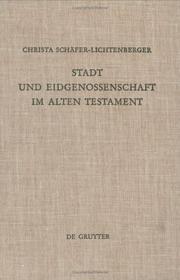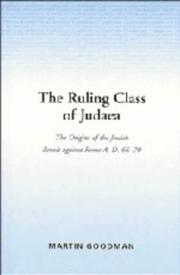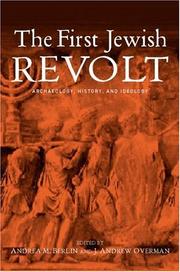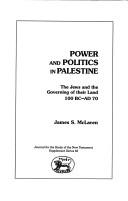| Listing 1 - 10 of 12 | << page >> |
Sort by
|
Book
ISBN: 9782745323248 2745323245 Year: 2012 Volume: 46 Publisher: Paris Honoré Champion
Abstract | Keywords | Export | Availability | Bookmark
 Loading...
Loading...Choose an application
- Reference Manager
- EndNote
- RefWorks (Direct export to RefWorks)

ISBN: 3110085917 9783110085914 Year: 1983 Volume: 156 Publisher: Berlin de Gruyter
Abstract | Keywords | Export | Availability | Bookmark
 Loading...
Loading...Choose an application
- Reference Manager
- EndNote
- RefWorks (Direct export to RefWorks)
Jews --- Sociology, Biblical --- Politics in the Bible --- Politics and government --- Weber, Max, --- 908 <33> --- -Politics in the Bible --- Christian sociology --- Religion and sociology --- Political science --- Political science in the Bible --- Politics, Practical --- Hebrews --- Israelites --- Jewish people --- Jewry --- Judaic people --- Judaists --- Ethnology --- Religious adherents --- Semites --- Judaism --- Heemkunde. Area studies--Oud-Palestina. Judea --- -Biblical teaching --- Biblical teaching --- Weber, Max --- ウェーバー --- -Weber, Max --- 908 <33> Heemkunde. Area studies--Oud-Palestina. Judea --- Jews - Politics and government - To 70 A.D. --- Weber, Max, - 1864-1920
Book
ISBN: 3788706201 9783788706203 Year: 1980 Publisher: Neukirchen-Vluyn Neukirchener Verl.
Abstract | Keywords | Export | Availability | Bookmark
 Loading...
Loading...Choose an application
- Reference Manager
- EndNote
- RefWorks (Direct export to RefWorks)
Jews --- Politics and government --- 933.1 --- -Hebrews --- Israelites --- Jewish people --- Jewry --- Judaic people --- Judaists --- Ethnology --- Religious adherents --- Semites --- Judaism --- Geschiedenis van het Joodse volk: pre-dynastieke tijd --- -933.1 --- -Geschiedenis van het Joodse volk: pre-dynastieke tijd --- 933.1 Geschiedenis van het Joodse volk: pre-dynastieke tijd --- -Jews --- -933.1 Geschiedenis van het Joodse volk: pre-dynastieke tijd --- Hebrews --- Jews - Politics and government - To 70 A.D

ISBN: 0521334012 0521447828 0511552653 9780521334013 Year: 1989 Publisher: Cambridge Cambridge University press
Abstract | Keywords | Export | Availability | Bookmark
 Loading...
Loading...Choose an application
- Reference Manager
- EndNote
- RefWorks (Direct export to RefWorks)
This book examines why in AD 66 a revolt against Rome broke out in Judaea. It attempts to explain both the rebellion itself and its temporary success by discussing the role of the Jewish ruling class in the sixty years preceding the war and within the independent state which lasted until the destruction of the Temple in AD 70. The author seeks to show that the ultimate cause of the Revolt was a misunderstanding by Rome of the status criteria of Jewish society. The importance of the subject lies both in the significance of the history of Judaea in this period for the development of Judaism and early Christianity and in the light shed on Roman methods of provincial administration in general by an understanding of why Rome was unable to control a society with cultural values so different from its own.
Jews --- -Jews --- -Political leadership --- -Hebrews --- Israelites --- Jewish people --- Jewry --- Judaic people --- Judaists --- History --- -Causes --- -Politics and government --- -History --- Political leadership --- Leadership --- Hebrews --- Ethnology --- Religious adherents --- Semites --- Judaism --- History&delete& --- Causes --- Politics and government --- Causes. --- History. --- Juifs --- Leadership politique --- Histoire --- Politique et gouvernement --- Arts and Humanities --- Jews - Politics and government - To 70 A.D. --- Political leadership - Palestine - History --- Jews - History - 168 B.C.-135 A.D.
Book
ISBN: 1589834070 9781589834071 1589834062 9781589834064 9781589834064 Year: 2009 Volume: 27 Publisher: Atlanta Society of Biblical Literature
Abstract | Keywords | Export | Availability | Bookmark
 Loading...
Loading...Choose an application
- Reference Manager
- EndNote
- RefWorks (Direct export to RefWorks)
Zealots (Jewish party) --- Jews --- Jewish-Roman War, 66-73 --- Roman-Jewish War, 66-73 --- Ḳannaʾim --- Sicarii --- Essenes --- Jewish sects --- Pharisees --- History. --- History --- Politics and government --- 296*334 --- 296*334 Flavius Josephus:--studies --- Flavius Josephus:--studies --- Zélotes (Secte juive) --- Juifs --- Histoire --- Politique et gouvernement --- Zealots (Jewish party) - History. --- Jews - History - 168 B.C.-135 A.D. --- Jews - History - Rebellion, 66-73. --- Jews - Politics and government - To 70 A.D.

ISBN: 1134518323 0203283007 1280048638 0203167449 9780203167441 0415257069 9780415257060 9786610048632 6610048630 9781134518272 9781134518319 9781134518326 9780415620246 1134518315 Year: 2002 Publisher: London Routledge
Abstract | Keywords | Export | Availability | Bookmark
 Loading...
Loading...Choose an application
- Reference Manager
- EndNote
- RefWorks (Direct export to RefWorks)
The First Jewish Revolt against Rome is arguably the most decisive event in the history of Judaism and Christianity. The destruction of the Temple in Jerusalem in 70 CE by the Roman General Titus forced a transformation in structure and form for both of these fraternal religions. Yet despite its importance, little has been written on the First Revolt, its causes, implications and the facts surrounding it.In this volume, Andrea M. Berlin and J. Andrew Overman have gathered the foremost scholars on the period to discuss and debate this pivotal historical event. The contributions explore both
Jews --- Excavations (Archaeology) --- Archaeological digs --- Archaeological excavations --- Digs (Archaeology) --- Excavation sites (Archaeology) --- Ruins --- Sites, Excavation (Archaeology) --- Archaeology --- Hebrews --- Israelites --- Jewish people --- Jewry --- Judaic people --- Judaists --- Ethnology --- Religious adherents --- Semites --- Judaism --- History --- Causes. --- Politics and government --- Galilee (Israel) --- Galil (Israel) --- Israel, Northern --- Jalīl (Israel) --- Northern Israel --- Northern Palestine --- Palestine, Northern --- Antiquities. --- Jews - History - Rebellion, 66-73 - Causes. --- Jews - History - 168 B.C.-135 A.D. --- Jews - Politics and government - To 70 A.D. --- Excavations (Archaeology) - Israel - Galilee. --- Galilee (Israel) - Antiquities. --- Causes
Book
ISBN: 9783110283358 3110283352 9783110283488 9786613940490 3110283484 128362804X Year: 2012 Volume: 434 Publisher: Berlin Boston
Abstract | Keywords | Export | Availability | Bookmark
 Loading...
Loading...Choose an application
- Reference Manager
- EndNote
- RefWorks (Direct export to RefWorks)
The Jehuite Dynasty ruled more than ninety years (841-747 BCE) in the Kingdom of Israel, the longest dynasty in the history of the Northern Kingdom. Under the five kings of the dynasty, Israel was thrown into the arena of the regional political struggles and experienced the time of an unprecedented upheaval and then enjoyed great prosperity. The Aramaeans under Hazael and Ben-Hadad of Damascus and the Assyrians from the north Mesopotamia had great influence on the history of the dynasty. This book is the result of a comprehensive and updated historical study on this significant dynasty. By consulting all the available Assyrian, Aramaic, Hebrew, and Moabite inscriptions and recent archaeological data, this study radically evaluates the historical authenticity of the biblical text of 2 Kings and some parts of the Books of Amos and Hosea and integrates the results into the historical discussion. The study reveals the great importance of this dynasty in the history of the Northern Kingdom as a turning point in its policy toward the Neo-Assyrian Empire and will contribute toward understanding the history of Syria-Palestine in the 9th-8th centuries BCE.
Jews --- 222.6 --- History --- Samuelboeken. Boeken der koningen. David. Salomon. Elia. Elisa. Josias --- Politics and government --- Jehuite dynasty, --- Jehu, --- Bible. --- Kings, 2nd (Book of the Old Testament) --- Melakhim 2 (Book of the Old Testament) --- Melakhim bet (Book of the Old Testament) --- Second Kings (Book of the Old Testament) --- Criticism, interpretation, etc. --- Arameans --- Syria --- Middle East --- History. --- Antiquities. --- Bible. O.T. Kings, 2nd -- Criticism, interpretation, etc. --- Jehu, King of Israel. --- Jehuite dynasty, 9th-8th centuries B.C. --- Jews -- History -- To 586 B.C. --- Jews -- Politics and government -- To 70 A.D. --- Regions & Countries - Asia & the Middle East --- History & Archaeology --- Ethnology --- Aram-Damascus. --- Book of Kings. --- Hazael. --- Jehu. --- Kingdom of Israel.

ISBN: 1850753199 1474230520 9781850753193 Year: 1991 Volume: 63 Publisher: Sheffield JSOT
Abstract | Keywords | Export | Availability | Bookmark
 Loading...
Loading...Choose an application
- Reference Manager
- EndNote
- RefWorks (Direct export to RefWorks)
A historical examination of the administration in Palestine between 100 BC and AD 70. Detailed case studies of such sources as Josephus, the New Testament and Philo establish who was actually involved in the decision-making process and political manoeuvering. The main issues addressed include: whether there was a system of Jewish government, and whether it included a permanent institution, the Sanhedrin; whether there is evidence that political and religious affairs were separated; whether the Jews were able to convict and execute people under Roman rule; what roles, if any, were played by ind
Jews --- Political leadership --- Romans --- History --- Politics and government --- History. --- Bible. N.T. -- History of contemporary events. --- Jews -- Civilization -- To 70 A.D. --- Jews -- History -- To 70 A.D. --- Jews -- Politics and government -- To 70 A.D. --- Judaism -- History -- To 70 A.D. --- Regions & Countries - Asia & the Middle East --- History & Archaeology --- Middle East --- 933.33 --- -Jews --- -Political leadership --- -Romans --- -Ethnology --- Italic peoples --- Latini (Italic people) --- Leadership --- Hebrews --- Israelites --- Jewish people --- Jewry --- Judaic people --- Judaists --- Ethnology --- Religious adherents --- Semites --- Judaism --- Geschiedenis van het Joodse volk: Romeinse tijd I; Masadah; vernieling van deTempel--(63 v.Chr.-70 n.Chr.) --- -Politics and government --- -History --- Palestine --- -Holy Land --- -933.33 --- -Geschiedenis van het Joodse volk: Romeinse tijd I; Masadah; vernieling van deTempel--(63 v.Chr.-70 n.Chr.) --- 933.33 Geschiedenis van het Joodse volk: Romeinse tijd I; Masadah; vernieling van deTempel--(63 v.Chr.-70 n.Chr.) --- -Hebrews --- Jews - History - 168 B.C.-135 A.D. --- Jews - Politics and government - To 70 A.D. --- Political leadership - Palestine - History. --- Romans - Palestine.

ISBN: 9004078533 9004275606 9789004078536 Year: 1985 Volume: v. 37 Publisher: Leiden Brill
Abstract | Keywords | Export | Availability | Bookmark
 Loading...
Loading...Choose an application
- Reference Manager
- EndNote
- RefWorks (Direct export to RefWorks)
Sociology, Biblical --- Jews --- History --- Politics and government --- Bible --- Historiography --- Criticism, interpretation, etc --- 933 --- -Jews --- -Sociology, Biblical --- Christian sociology --- Religion and sociology --- Hebrews --- Israelites --- Jewish people --- Jewry --- Judaic people --- Judaists --- Ethnology --- Religious adherents --- Semites --- Judaism --- Geschiedenis van Palestina en het Joodse volk --- -Politics and government --- -Biblical teaching --- Sociology, Biblical. --- Bible. --- Historiography. --- Criticism, interpretation, etc. --- -933 --- 933 Geschiedenis van Palestina en het Joodse volk --- Biblical teaching --- Conquest of Canaan --- Settlement in Canaan --- Wanderings in the wilderness --- Antico Testamento --- Hebrew Bible --- Hebrew Scriptures --- Kitve-ḳodesh --- Miḳra --- Old Testament --- Palaia Diathēkē --- Pentateuch, Prophets, and Hagiographa --- Sean-Tiomna --- Stary Testament --- Tanakh --- Tawrāt --- Torah, Neviʼim, Ketuvim --- Torah, Neviʼim u-Khetuvim --- Velho Testamento --- Ancien Testament. Histoire biblique. --- Oud Testament. Geschiedenis van bijbelse gebeurtenissen. --- Jews - History - To 1200 B.C --- Jews - Politics and government - To 70 A.D

ISSN: 00835889 ISBN: 9004096469 9004275711 9789004096462 Year: 1992 Volume: v. 47
Abstract | Keywords | Export | Availability | Bookmark
 Loading...
Loading...Choose an application
- Reference Manager
- EndNote
- RefWorks (Direct export to RefWorks)
The epoch from the eighth century B.C.E. up to the exile is marked by a great transformation in the society of ancient Judah, as reflected especially in the texts of the pre-exilic prophets. A relatively egalitarian society transforms into a class society, wherein a class of wealthy landowners is opposed to a growing class of impoverished farmers. The main factor in this development is the indebtedness of the farmers. All the forces of society and state are afflicted by this transformation. This book endeavours to describe this transformation as precisely as possible, by examining the prophetical texts , and other biblical and epigraphical materials. Unlike the theories of 'annuity capitalism' or 'antique development' the work especially stresses the role of the state and its organs in this transformation. Die Zeit vom 8. Jahrhundert bis zum Exil ist die Zeit eines gewaltigen gesellschaftlichen Umbruchs im antiken Juda, wie er sich vor allem in den Texten der vorexilischen Propheten widerspiegelt. Eine relativ egalitäre Gesellschaft transformiert sich in eine Klassengesellschaft, bei der wenige Grundbesitzer einer größer werdenden Klasse verarmter Bauern gegenüberstehen. Von diesem Umbruch, dessen Hauptfaktor die Überschuldung der kleinen Bauern ist, werden alle Kräfte der Gesellschaft und des Staates erfaßt. Die vorliegende Arbeit versucht, anhand der einschlägigen prophetischen Texte, des übrigen biblischen sowie des epigraphischen Materials diesen Umbruch möglichst umfassend zu beschreiben. Anders als bei den gegenwärtig vertretenen Theorien des 'Rentenkapitalismus' und der 'antiken Entwicklung' wird dabei besonderes Gewicht auf die Rolle des Staates und seiner Organe bei der gesellschaftlichen Umwälzung gelegt. Das Buch wendet sich an Exegeten, die auf dem Feld der Sozialgeschichte Israels, der vorexilischen Prophetie und der althebräischen Epigraphik arbeiten.
Sociology, Biblical. --- Jews --- Politics and government --- History --- 933.21 --- 224 --- -Jews --- -Hebrews --- Israelites --- Jewish people --- Jewry --- Judaic people --- Judaists --- Ethnology --- Religious adherents --- Semites --- Judaism --- Geschiedenis van het Joodse volk: Verenigd Koninkrijk--(ca.1000-931 v.Chr.) --- Profetische boeken van het Oude Testament --- -Politics and government --- -933.21 --- -Geschiedenis van het Joodse volk: Verenigd Koninkrijk--(ca.1000-931 v.Chr.) --- 933.21 Geschiedenis van het Joodse volk: Verenigd Koninkrijk--(ca.1000-931 v.Chr.) --- -Sociology, Biblical. --- Sociology, Biblical --- Christian sociology --- Religion and sociology --- Biblical teaching --- Bible. --- Later Prophets --- Latter Prophets --- Neviʼim aḥaronim --- Nevym achronim --- Prophetae Posteriores --- Prophets (Books of the Old Testament) --- Yeŏnsŏ --- Criticism, interpretation, etc. --- Jews - Politics and government - To 70 A.D. --- Jews - History - 953-586 B.C.
| Listing 1 - 10 of 12 | << page >> |
Sort by
|

 Search
Search Feedback
Feedback About UniCat
About UniCat  Help
Help News
News